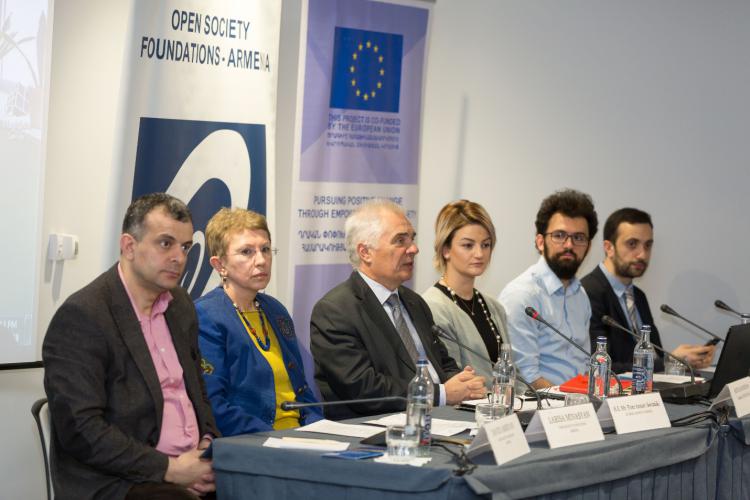
On February 27, 2018, the Open Society Foundations – Armenia organised a press conference to inaugurate the project, Pursuing positive change through empowering the civil society. The foundation is going to implement the project with two partners, the Institute of Public Policy NGO and the Union of Informed Citizens NGO. The majority of the project budget (EUR 460,035) is financed by the European Union with a contribution of 400,000 EUR, and it was selected through a competitive Call for Proposal.
The project will work with civil society organisations operating in the areas of human rights, criminal justice and social equity to help them bring consistency and cooperation in monitoring government reforms and policies, and do this with commonly recognised tools and methods that allow comparison and analysis and provide data to underpin the common civil society advocacy issues.
The project has a strong focus on engaging youth, young activists and journalists. It will serve as a bridge between the established human rights advocates in Armenia and younger generations of activists interested in gaining more expertise in defending rights of the RA citizens. Together with the partners, the foundation will organise various types of training and coaching for civil society organisations, journalists and youth organisations, and will establish a Knowledge Hub to serve as a resource centre for the research tools and monitoring methodology and to store the collected monitoring data. The project will also produce media material to increase knowledge and awareness as well as engage ordinary people in dialogue on human rights, criminal justice and social justice.
The press conference gathered the representatives of different civil society organisations, international non-governmental organisations, journalists, human rights activists, representatives from the communities and youth centres in different regions of Armenia. H.E. Mr. Piotr Antoni Świtalski, Ambassador and Head of the EU Delegation to Armenia made the opening remarks of the event. Welcoming the consortium of the organisations that would coordinate and implement the project and congratulating the beneficiaries, the ambassador noted that “this project has special value for the European Union […] as it brings together three very important factors: civic activism, young people and human rights.” He reminded that, in 2018, we were celebrating the seventieth anniversary of the Universal Declaration of Human Rights, and through the specific actions and projects, “the European Union was showing that the Universal Declaration of Human Rights was a living document,” that it was “an important point of reference in our activities across the globe and in this region.” He noted that “the young generation was of particular importance to the European Union,” and they “believed that the young generation in Armenia was the engine for development and the biggest hope for building in Armenia a European model of governance.” The ambassador mentioned that as a concept, human rights were still new in human history and were in an evolving stage, whereas, the young generation could embrace new technologies and had the potential to understand how the human rights evolve and interact with each other. He was hopeful that the project’s output and implications would go beyond the training and delivering of the necessary knowledge and the people engaged in this project would promote the ideas that form the core of the European Union’s engagement in Armenia. Reminding the Comprehensive and Enhanced Partnership Agreement (CEPA) that Armenia and the European Union had signed, he viewed the project and its activities essential in ensuring the monitoring of the implementation process.
Larisa Minasyan, the executive director of the Open Society Foundations – Armenia, emphasised that the fundamental goal of the project was to support civil society organisations and, primarily, the young generation of human rights defenders. “Civil society is the quintessential link between the government and the society. Whereas, today, the vital space, where the civil society develops dialogue and exercises free speech, is shrinking everywhere in the world,” she noted. “Bringing new forces and engaging the youth is central to withstand the threats to the civic space.” For such a broadscale project, however, the foundation did not have the required resources. Ms. Minasyan expressed her gratitude to the European Union for their support and encouraged the civil society representatives to join and support the project to see a tangible change in two years, when the program would conclude its activities.
